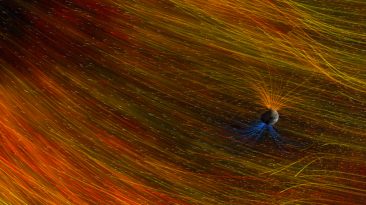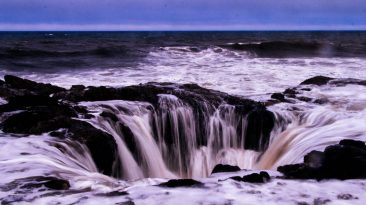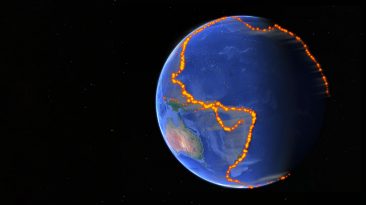Something is very wrong with our Sun. It’s turned into a spinning lighthouse of death. What would make the Sun so much more deadly than usual? Would there be any way life on Earth could survive this? And why would it feel like you’re stuck at the bottom of the ocean?
Many stars go out with a bang, exploding in brilliant supernovas. But our Sun has gone straight to becoming a pulsar, sometimes called a neutron star. You could take this as some good news. The Sun exploding would obliterate Earth and nearly the rest of the Solar System along with it.
But now that it’s a neutron star, the Sun would be among the densest objects in the Universe. And one of about 200,000 pulsars in the Milky Way. Shrinking to about 70,000 times the size it used to be, it wouldn’t be much bigger than a small city at 10 km (12.5 mi) across. And it would be spinning very fast.
If it’s anything like a pulsar located in the Virgo constellation, it could make about 161 rotations every second. Oh, and it would also shoot beams of deadly radiation directly toward Earth every few seconds. Or even milliseconds. The first thing you’d notice would be that things suddenly got a lot darker. Our Sun would emit almost no visible light.
But you’d still be able to catch quick glimpses of it. Though only for the extremely brief moment that its pulse of energy is directly pointing at us. The Sun would now be like a pulsing lighthouse at the center of our Solar System. This eternal darkness would cause a lot of problems back on Earth. There would be no more photosynthesis.
Trees would no longer be able to produce oxygen and crops wouldn’t grow. So animals and humans would be on the brink of mass starvation. But there would be good news. Astronomers have found exoplanets existing in a pulsar’s habitable zone. So maybe, just maybe, you’d have a chance to survive this.
Especially because the habitable zone of a pulsar could be nearly as large as a normal star. That would mean it could still be possible for liquid water to exist on Earth’s surface. But this liquid water would only be able to exist thanks to our warm atmosphere trapping energy from the Sun. And while there wouldn’t be much visible light, there would be a lot of radiation.
That’s because neutron stars have incredibly strong magnetic fields. This would cause beams of X-rays and gamma rays to shoot out from the Sun’s poles. And this would be very bad news. All this radiation would be highly lethal. In order to prevent it from reaching the ground, our atmosphere would need to be thicker. Maybe as thick as a million times what it is today.
If you managed to pump enough air into the atmosphere to reach this desired thickness, you’d have to get used to living with atmospheric pressure as intense as the deepest parts of the ocean. It would be like going down 10 km (6.2 mi) to the bottom of the Mariana Trench. You wouldn’t even be able to get close to that depth before you’d get completely crushed.
Before you even hit the halfway point your eardrums would rupture and your lungs would fill with blood and collapse. But you might not need to worry about this. Because Earth wouldn’t be able to hold such a dense atmosphere in place. The relentless radiation would just blast it away.
If enough of the atmosphere disappeared, the liquid water on Earth’s surface would eventually boil away. And that would be the guaranteed demise of human life on this once habitable space rock. Which makes me think what would happen if the oceans simply boiled away?
Sources
- “What Are Pulsars?”. Calla Cofield. 2016. space.com.
- “Neutron Stars”. 2022. imagine.gsfc.nasa.gov.
- “What Are Pulsars?”. Paul Sutter. 2022. livescience.com.
- “Pulsars – Celestial Objects On Sea And Sky”. 2022. seasky.org.
- “Weird Object: Pulsar Planets”. Bob Berman. 2015. astronomy.com



























